Politics
For the first time in Pakistan’s judicial history, Supreme Court proceedings go live
Published
2 years agoon
By
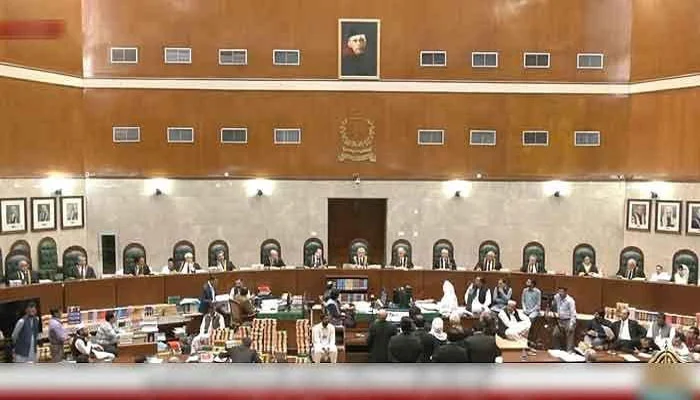
ISLAMABAD: For the first time in the country’s judicial history, the Supreme Court’s full court — comprising all 15 judges of the apex court — allowed live telecast of proceedings on a set of petitions challenging the SC (Practice and Procedure) Act 2023 — the contentious law seeking to regulate suo motu powers of the country’s top judge.
Chief Justice of Pakistan (CJP) Qaez Faez Isa-led full court is currently conducting the hearing on the petitions being broadcast live on state television PTV.
The apex court declared the petitions seeking full court hearing on the petitions admissible. CJP Isa said that the decision to hold a full court hearing was taken in the full court meeting.
During the hearing, CJP Isa said arguments in the case will begin afresh because the new bench has been formed.
There were three applications to make a full court, which had been approved, CJP Isa observed.
Ahead of the hearing today, the Attorney General for Pakistan (AGP) Mansoor Usman Awan submitted the federal government’s response in the matter, requesting the court to reject the petitions against the Supreme Court Practice and Procedure Act.
“Petitions against acts of parliament are inadmissible. [Therefore,] the petitions against the Practice and Procedure Act should be dismissed,” the response submitted by the government contended.
Sources confirmed to Geo News that the decision was made in the full court meeting ahead of the proceedings.
To this end, five cameras were installed in the courtroom number one. Four cameras were installed in the visitors’ gallery and one was installed for the lawyers’ rostrum in front of the judges’ docks.
The full court was constituted by newly-appointed Chief Justice of Pakistan Qazi Faez Isa and includes Justice Sardar Tariq Masood, Justice Ijazul Ahsan, Justice Syed Mansoor Ali Shah, Justice Munib Akhtar, Justice Yahya Afridi, Justice Aminuddin Khan, Justice Sayyed Mazahar Ali Akbar Naqvi, Justice Jamal Khan Mandokhel, Justice Muhammad Ali Mazhar, Justice Ayesha A. Malik, Justice Athar Minallah, Justice Syed Hasan Azhar Rizvi, Justice Shahid Waheed and Justice Musarrat Hilali.
Prior to this, a full court meeting was held to consider live broadcasting of today’s proceedings and ponder over guidelines for effective hearing of cases. According to the sources, instructions for the live broadcast were issued yesterday (Sunday) — hours after Justice Isa took oath as the CJP.
Upon his arrival, CJP Isa — who reached the apex court in his personal car without protocol — said to the SC staff: “People come to the Supreme Court to solve their problems. Treat visitors like guests.”
He further said that the doors to justice should be kept open.
The hearing
There are nine applications, the CJP remarked at the outset of the hearing, requesting Advocate Khawaja Tariq Rahim to begin his arguments.
The CJP asked counsel Rahim to read the Act and “forget the past”.
Justice Ayesha asked the advocate what the effect of Section 5, which gives the right of appeal, would be if the law is sustained.
“Given that the full bench will hear the case. Would the appeal not be heard?”
“Parliament formed a committee of 3 judges to decide on the matters of public interest,” Rahim said while referring to the practice act.
To which Justice Mandokhail asked, “What does Article 191 of the Constitution say?
“The Constitution empowers Parliament to legislate,” Khawaja said, adding that the apex court had made its rules through the full court.
During the reading of the Act, Justice Mansoor remarked: “What I understand of your point is that if all this is done by the full court, then it is acceptable; If Parliament does this, then it is wrong.”
“Can the powers of the chief justice be nullified by legislation? Justice Musrat asked.
Upon this Justice Mandokhail asked if the legislation abolished the powers of the chief justice or the Supreme Court.
Are you satisfied if the chief justice has unlimited power to form a bench? Justice Athar questioned, while both CJP Isa and Justice Mazhar requested advocate Rahim to mention which section of the law the petitioner objected to and what article of the constitution the act is in conflict with.
“Can’t three judges sit and interpret the constitution?” he pointed out. However, the CJP responded that only the number is being discussed in the legislation not the competency of the judges.
As a number of pertinent questions regarding the power and authority of parliament were raised, the CJP reiterated that the advocate should take down the questions, and respond to them later.
“My colleagues are asking you good questions,” he said, asking the lawyer to take his time in responding to them.
Furthermore, the CJP chided counsel Rahim for referring to his “personal opinion” during the arguments and asked him to stick to the law.
“What is this ‘personal opinion’, please talk about the law,” the CJP said.
He further asked: “Whose right can be taken away by this law?”
Rahim contended that parliament had “interfered” with the rules of the Supreme Court.
Justice Athar asked: “Do you support what happened in the past?”
During the hearing, the CJP asked the advocate to comment on whether he believed the whole law to be wrong or a few clauses.
“According to Schedule 4 of the Federal Legislative List, the Supreme Court makes its own rules of practice and procedure,” the counsel replied.
Was this authority given to the Supreme Court in the Constitution or in the law? Justice Mandokhel asked.
Advocate Rahim said that he would respond to the queries later.
Justice Athar then asked: “Is it not within the purview of the parliament to make this law?”
Do not want absolute powers: CJP
During the hearing, the CJP remarked: “This court runs on the taxes of the people.”
If this law is struck down, the chief justice will benefit, the CJP said. However, he added: “A judge takes an oath to abide by the Constitution and the law.”
He further observed that as the top judge of the country, he did not want absolute authority. “Rs6.5 billion dollars were lost due to the court’s decision in the Reko Diq case, As chief justice, I do not want such authority,” the CJP remarked.
“I have not sworn to obey the judgments of the Supreme Court. I have taken oath to uphold the law and the Constitution, ” he said.
‘Law not against SC’
After a brief hiatus, Attorney General Mansoor Usman Awan appeared before the court and argued that the petitions were inadmissible.
He said that the law dealt with the powers of one office, not the entire judiciary, and aimed to bring “democratic transparency” to the institution.
He further contended that the law, au contraire to the claims of the petitioners, actually served in the public interest.
The AGP further argued that since no external check or institution was involved or imposed by the Act, it did not, in fact, curtail the power of the institution as a whole.
‘Mistake made in Zulfikar Ali Bhutto case’
During the course of proceedings, CJP Isa observed that there was also a public opinion that Article 184/3 was misused. The three-member bench nullified the Reko Diq agreement causing a loss of $6.5 billion to the country.
It was the opinion of the judges and it was not corrected, he added. The top judge admitted that they made mistakes. “Mistake was made in the Zulfikar Ali Bhutto’s case.”
“We have a huge ego. We endorsed martial law,” the CJP remarked, adding that the judges should admit that they also made omissions.
CJP Isa continued, “We take suo motu notices over every matter then whey can’t on legislation about ourselves.”
In Bhutto’s case, the review petition was also heard by the same judges who handed him the death penalty, the top judge stated. “Our ego should not be so huge that we do not admit our mistake.”
At this, Justice Minallah asked if the masses filed petitions after the endorsement of martial law and said, “We should also be held accountable.”
Top court rules are there to guide us: CJP Isa
During the hearing, CJP Isa asked AGP Awan whether he was liable to follow the 1980 rules of the Supreme Court.
“Rules are there to guide us not to limit us,” the top judge observed.
However, Justice Akhtar said that the judges are not bound by the SC Rules, adding that in such a situation how can the Supreme Court judges be bound by the Act being challenged in the court?
Following this, CJP Isa announced that they were taking a “short break” and would resume hearing of the case.
However, as the judges were leaving the courtroom PTI’s lawyer Aziz Bhandari came to the rostrum.
Justice Isa, while addressing Bhandari, asked, “Whose lawyer are you?” He replied, “PTI’s”. The top judge then assured him that they would listen to his arguments after recess.
Meanwhile, Justice Ahsan — on behalf of all the judges — conveyed good wishes to the attorney general who has to travel abroad today in connection with the Indus Water Treaty case.
At this, Justice Tariq observed: “The matter will end if we nullify the Act. But, if the law remains intact, then what will happen to the verdicts announced in the meantime?”
The attorney general replied that the “past and close transaction rule” may be applied in such cases. He maintained that the court could give protection to the verdicts made in the past. The attorney general apprised the court that he had completed his arguments in the case.
Case background
On April 13, an eight-member bench of the Supreme Court stayed the implementation of the law, which deals with the powers of the top judge in matters of public interest and seeks to limit the suo moto powers of the Chief Justice of Pakistan.
During the previous hearing in June, the similarities between the Supreme Court (Review of Judgments and Orders) Act 2023 — which relates to the right of appeal in suo motu cases — and the SC Practice and Procedure Act were discussed with Attorney General for Pakistan (AGP) Mansoor Usman Awan saying that parliament could look into “harmonising” the two laws.
The then-CJP — while he welcomed the proposal — said that the federal government should take the top court into consideration when making any legislation related to the judiciary.
The law
The law gave the power of taking sou motu notice to a three-member committee comprising senior judges including the chief justice. It further aimed to have transparent proceedings in the apex court and includes the right to appeal.
Regarding the constitution of benches, the Act stated that every cause, matter or appeal before the apex court would be heard and disposed of by a bench constituted by a committee comprising the CJP and the two senior-most judges.
It added that the decisions of the committee would be taken by a majority.
Regarding exercising the apex court’s original jurisdiction, the Act said that any matter invoking the use of Article 184(3) would first be placed before the committee.
On matters where the interpretation of the Constitution is required, the Act said the committee would compose a bench comprising no less than five apex court judges.
About appeals for any verdict by an apex court bench that exercised Article 184(3)‘s jurisdiction, the Act said that the appeal would lie within 30 days of the bench’s order to a larger SC bench. It added that the appeal would be fixed for hearing within a period not exceeding 14 days.
It added that this right of appeal would also extend retrospectively to those aggrieved persons against whom an order was made under Article 184(3) prior to the commencement of the SC (Practice and Procedure), Act 2023, on the condition that the appeal was filed within 30 days of the Act’s commencement.
The Act additionally said that a party would have the right to appoint its counsel of choice for filing a review application under Article 188 of the Constitution.
Furthermore, it states that an application pleading urgency or seeking interim relief, filed in a cause, appeal or matter, shall be fixed for hearing within 14 days from the date of its filing.
You may like
-
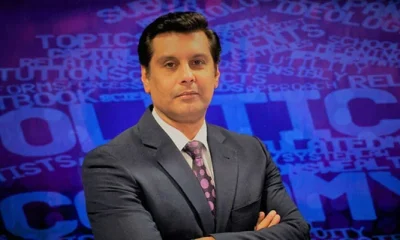

Arshad Sharif’s wife files lawsuit against Kenyan police over journalist’s killing
-
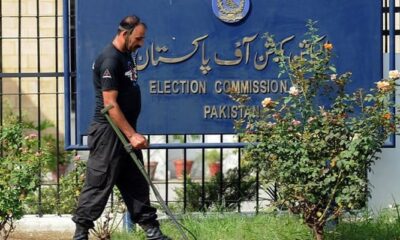

PTI urges ECP to issue order on election symbol
-


Task force on the cards as NAB aims to boost accountability process
-
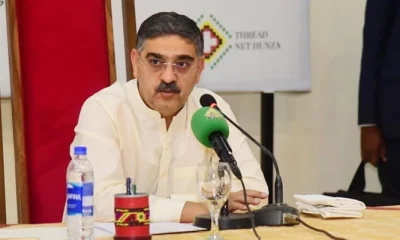

PM Kakar to attend UN climate moot in UAE next month
-
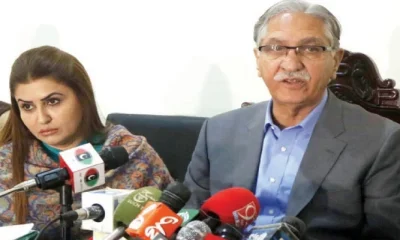

PPP raises concerns over ‘special relief’ to Nawaz on return
-
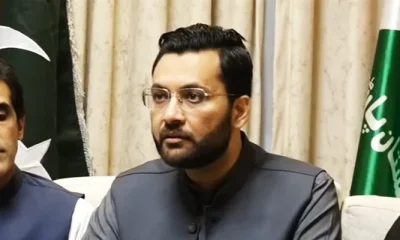

Farrukh Habib parts ways with Imran Khan-led PTI

In a unanimous verdict, a five-member bench of the Supreme Court on Monday declared civilians’ trials in military courts null and void as it admitted the petitions challenging the trial of civilians involved in the May 9 riots triggered by the arrest of Pakistan Tehreek-e-Insaf (PTI) chief Imran Khan in a corruption case.
The five-member apex court bench — headed by Justice Ijaz Ul Ahsan, and comprising Justice Munib Akhtar, Justice Yahya Afridi, Justice Sayyed Mazahar Ali Akbar Naqvi and Justice Ayesha Malik — heard the petitions filed by the PTI chief and others on Monday.
The larger bench in its short verdict ordered that 102 accused arrested under the Army Act be tried in the criminal court and ruled that the trial of any civilian if held in military court has been declared null and void.
The apex court had reserved the verdict earlier today after Attorney General of Pakistan (AGP) Mansoor Usman Awan completed his arguments centred around the domain and scope of the military courts to try the civilians under the Army Act.
At the outset of the hearing today, petitioner lawyer Salman Akram Raja told the bench that trials of civilians already commenced before the top court’s verdict in the matter.
Responding to this, Justice Ahsan said the method of conducting proceedings of the case would be settled after Attorney General of Pakistan (AGP) Mansoor Usman Awan completed his arguments.
Presenting his arguments, the AGP said he would explain to the court why a constitutional amendment was necessary to form military courts in 2015 to try the terrorists.
Responding to Justice Ahsan’s query, AGP Awan said the accused who were tried in military courts were local as well as foreign nationals.
He said the accused would be tried under Section 2 (1) (D) of the Official Secrets Act and a trial under the Army Act would fulfill all the requirements of a criminal case.
“The trial of the May 9 accused will be held in line with the procedure of a criminal court,” the AGP said.
The AGP said the 21st Amendment was passed because the terrorists did not fall in the ambit of the Army Act.
“Amendment was necessary for the trial of terrorists [then] why amendment not required for the civilians? At the time of the 21st constitutional amendment, did the accused attack the army or installations?” inquired Justice Ahsan.
AGP Awan replied that the 21st Amendment included a provision to try accused involved in attacking restricted areas.
“How do civilians come under the ambit of the Army Act?” Justice Ahsan asked the AGP.
Justice Malik asked AGP Awan to explain what does Article 8 of the Constitution say. “According to Article 8, legislation against fundamental rights cannot be sustained,” the AGP responded.
Justice Malik observed that the Army Act was enacted to establish discipline in the forces. “How can the law of discipline in the armed forces be applied to civilians?” she inquired.
The AGP responded by saying that discipline of the forces is an internal matter while obstructing armed forces from discharging duties is a separate issue.
He said any person facing the charges under the Army Act can be tried in military courts.
“The laws you [AGP] are referring to are related to army discipline,” Justice Ahsan said.
Justice Malik inquired whether the provision of fundamental rights be left to the will of Parliament.
“The Constitution ensures the provision of fundamental rights at all costs,” she added.
If the court opened this door then even a traffic signal violator will be deprived of his fundamental rights, Justice Malik said.
The AGP told the bench that court-martial is not an established court under Article 175 of the Constitution.
At which, Justice Ahsan said court martials are not under Article 175 but are courts established under the Constitution and Law.
After hearing the arguments, the bench reserved the verdict on the petitions.
A day earlier, the federal government informed the apex court that the military trials of civilians had already commenced.
After concluding the hearing, Justice Ahsan hinted at issuing a short order on the petitions.
The government told the court about the development related to trials in the military court in a miscellaneous application following orders of the top court on August 3, highlighting that at least 102 people were taken into custody due to their involvement in the attacks on military installations and establishments.
Suspects express confidence in mly courts
The same day, expressing their “faith and confidence” in military authorities, nine of the May 9 suspects — who are currently in army’s custody — moved the Supreme Court, seeking an order for their trial in the military court be proceeded and concluded expeditiously to “meet the ends of justice”.
Nine out of more than 100 suspects, who were in the army’s custody, filed their petitions in the apex court via an advocate-on-record.
The May 9 riots were triggered almost across the country after former prime minister Imran Khan’s — who was removed from office via a vote of no confidence in April last year — arrest in the £190 million settlement case. Hundreds of PTI workers and senior leaders were put behind bars for their involvement in violence and attacks on military installations.
Last hearing
In response to the move by the then-government and military to try the May 9 protestors in military courts, PTI Chairman Imran Khan, former chief justice Jawwad S Khawaja, lawyer Aitzaz Ahsan, and five civil society members, including Pakistan Institute of Labour Education and Research (Piler) Executive Director Karamat Ali, requested the apex court to declare the military trials “unconstitutional”.
The initial hearings were marred by objections on the bench formation and recusals by the judges. Eventually, the six-member bench heard the petitions.
However, in the last hearing on August 3, the then-chief justice Umar Ata Bandial said the apex court would stop the country’s army from resorting to any unconstitutional moves while hearing the pleas challenging the trial of civilians in military courts.
A six-member bench, led by the CJP and comprising Justice Ijaz Ul Ahsan, Justice Munib Akhtar, Justice Yahya Afridi, Justice Sayyed Mazahar Ali Akbar Naqvi, and Justice Ayesha Malik, heard the case.
In the last hearing, the case was adjourned indefinitely after the Attorney General for Pakistan (AGP) Mansoor Usman Awan assured the then CJP that the military trials would not proceed without informing the apex court.
Politics
Arshad Sharif’s wife files lawsuit against Kenyan police over journalist’s killing
Published
2 years agoon
By
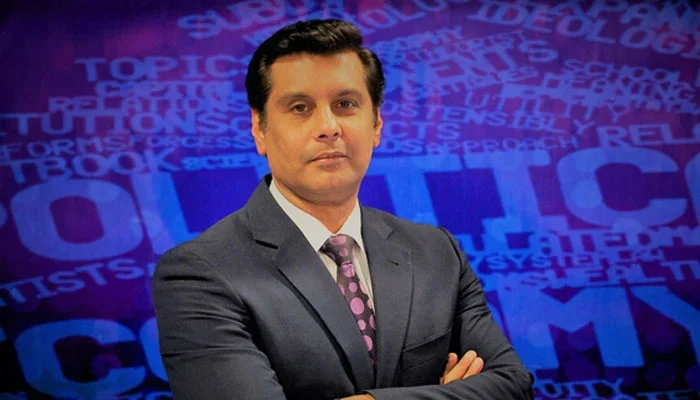
- Javeria Siddique filed lawsuit to “get justice for her husband”.
- Lawsuit also seeks “public apology” from Kenyan attorney general.
- Journalist was shot dead in October 2022 by Kenyan police officers.
NAIROBI: Slain journalist Arshad Sharif’s wife has registered a case against the Kenyan Elite police unit for her husband’s murder in Kenya, reported The News.
Javeria Siddique in her petition has made the attorney general of Kenya, national police service of the country and the director public prosecution respondents.
She has urged that the officers involved in Sharif’s murder be put on trial and be punished for their crime.
She urged the court to issue directives to the Kenyan attorney general (AG) to apologise to Sharif’s family within seven days of court’s orders, admit facts, accept responsibility and issue a written apology at public level.
Sharif’s widow, while confirming the filing of the case, said: “I have got a case registered in Nairobi for seeking justice in murder case of my husband. We got the case registered against general service unit of Kenya because they committed crime publicly and then admitted it was matter of mistaken identity. But to me it was targeted murder. But Kenyan government never apologised. They never contacted us.”
The registration of the case comes after it was reported the five Kenyan police officers who were involved in the killing quietly resumed their duties without any action taken against them.
Nine months after the killing of the journalist at a roadblock in a remote part of the East African country, the five police officers involved in the brutal killing are enjoying full police perks and their suspensions have turned out to be only a whitewash by the Kenyan authorities.
A trusted security source revealed that the five cops involved in the fatal shootout are back to work and two of them have been promoted to senior ranks.
Kenya’s Independent Policing and Oversight Authority (IPOA), the body that is tasked with investigating the conduct of police officers, despite making a promise to give an update on Sharif’s murder within weeks has not made its findings public in over nine months.
Sharif had arrived in the Kenyan capital on August 20 and died on October 23 last year in a shootout in which his driver Khurram Ahmad survived miraculously.
The 49-year-old had fled Pakistan in August to avoid arrest after he was slapped with several cases including sedition charges over an interview with Shahbaz Gill, a former aide of Imran Khan.
After reaching Kenya’s capital Nairobi, Sharif stayed at the Riverside penthouse of businessman Waqar Ahmad who is also Khurram’s brother who was driving him when he was killed.
The journalist was being driven from Ammodump Kwenia training camp, a joint which is owned by Waqar and they were heading to Nairobi County where he was staying.
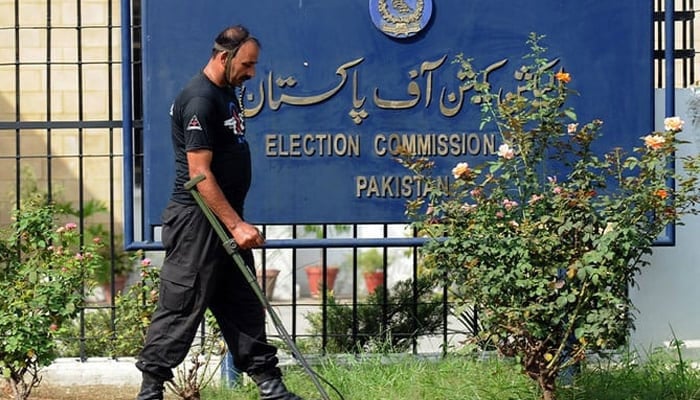
- ECP notice on inter-party elections “serious mistake,” says PTI.
- ECP has no justification for depriving PTI of symbol: Senator Zafar.
- 41 days passed but detailed decision not issued yet: PTI’s counsel.
ISLAMABAD: The Pakistan Tehreek-e-Insaf (PTI) has urged the Election Commission of Pakistan (ECP) to issue its verbal order regarding issuance of election symbol and reminded the electoral body of its constitutional duty to hold free and fair elections in the country, The News reported on Thursday.
Senator Barrister Syed Ali Zafar, the party’s counsel, on Wednesday filed an application with the Election Commission requesting for issuance of a detailed written order in the interest of justice and fairness.
The party has urged the Election Commission to issue a detailed decision without delay in light of its announcement concerning issuance of election symbols.
According to Senator Zafar, the Election Commission had issued a notice to the PTI for refusing to issue the symbol of “bat” on the basis of intra-party elections.
He insisted the commission’s notice on the basis of inter-party elections was a serious mistake, as the PTI had held intra-party elections on June 9, 2022 as per its constitution.
He maintained that the ECP had no justification of depriving the PTI of its symbol after holding the intra-party elections, as the electoral body had never objected to the intra-party elections but identified some defects in the submitted document, which had been removed.
The Election Commission in its August 30, 2023 decision, he pointed out, accepted the PTI’s decision to hold the intra-party elections and announced the decision to issue the election symbol of “bat” and after the August 30 decision of the Election Commission, the matter had become final and complete.
He recalled that at the time of the verbal announcement of the August 30 decision, the Election Commission announced to issue a detailed decision in this regard and this was widely highlighted in print, electronic and social media.
However, he noted, 41 days had passed since the August 30 decision, but a detailed decision had not yet been provided.
“PTI is the largest political party in the country, which is contesting the upcoming elections. Not issuing a detailed decision even after 41 days is a clear violation of fundamental rights, including articles 4, 9, 10A, 15, 16, 17 and 26 of the Constitution,” he said.
Ali Zafar insisted that according to the Constitution, the Election Commission was bound to hold free, fair, impartial and transparent elections, while avoiding detailed decisions was a deviation from this constitutional mandate.


Supreme Court annuls trials of civilians in military courts

Sea conditions ‘very high’ as Cyclone Tej moves towards northwestward

IMF condition: ECC set to green light gas tariff hike today

Barwaan Khiladi: Kinza Hashmi discusses her role as Alia

Snap launches tools for parents to monitor teens’ contacts

WATCH: Pakistani traveller deported from Dubai for damaging plane mid-air

Learn First | How to Create Amazon Seller Account in Pakistan – Step by Step

Sajjad Jani Funny Mushaira | Funny Poetry On Cars🚗 | Funny Videos | Sajjad Jani Official Team

